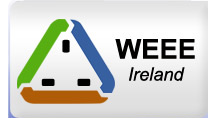
The Waste Management Regulations 2014 (S.I. No. 149 of 2014) (the WEEE Regulations) are designed to promote the recovery of WEEE, and to facilitate achievement of targets for the collection, treatment, recovery and disposal of waste electrical and electronic equipment (WEEE) in environmentally sound manner.
There are ten categories of WEEE: large and small household appliances, IT and telecommunications equipment, consumer equipment, lighting, electrical and electronic tools, toys, leisure and sports equipment, monitoring and control instruments, medical devices and automatic dispensers.
The Regulations impose obligations on persons who supply electrical and electronic equipment (EEE) to the Irish market, whether as retailers, importers or manufacturers, including those supplying EEE by means of distance communication (eg websites, catalogues).
'Distributor' is defined in the WEEE Regulations as any person who provides EEE on a commercial basis to the party who is going to use it. Retailers are therefore distributors for the purposes of the WEEE legislation.
Each distributor must:
- Be registered with their local authority
- Ensure that EEE they are distributing is originating from registered producers
- Provide for free take-back of household WEEE on a one-for-one basis, on the sale of a new like product, for products sold in-store or delivered
- Ensure that private householders are informed of the WEEE take-back facilities available to them and that they are encouraged to participate in the separate collection of WEEE
- Ensure that any WEEE taken back is not transferred to any person except a permitted collector acting on behalf of an approved collective scheme (eg WEEE Ireland or ERP) or a self-complying producer or is delivered to an approved collection facility
- Ensure that the storage and transport of WEEE collected as above meets the requirements of the Regulations
- Display Producer Recycling Fund contribution on price notices of categories of EEE to which it applies
- Display Statutory Notice regarding Producer Recycling Fund contribution
'Producer' is defined in the WEEE Regulations as any person who, irrespective of the selling technique used (including by means of distance communication):
- Manufactures and sells electrical and electronic equipment under his or her own brand
- Resells electrical and electronic equipment produced by other suppliers under his or her own brand
- Imports electrical and electronic equipment on a professional basis into the State
- Exports electrical and electronic equipment on a professional basis from the State to another European Union Member State
- Distributes electrical and electronic equipment from a producer who is deemed not to be registered under the provisions of article 12(2)
This is a Producer Responsibility Initiative (PRI), therefore producers have the most onerous responsibilities under the legislation. Producers are responsible for financing the environmentally sound management of WEEE and have responsibilities regarding collection, recycling and treatment targets.
Producers can self-comply under the Regulations, or join a compliance scheme. Currently there are two approved compliance schemes: European Recycling Platform (ERP) and WEEE Ireland. If a producer is a certified member of a compliance scheme they are exempt from certain requirements.
Further information: